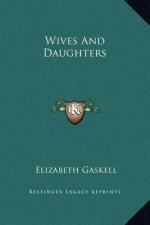’Please, ma’am, the great carriage from the Towers is coming up to the gate, and my lady the Countess is sitting inside.’ It was but eleven o’clock, and Mrs. Gibson would have been indignant at any commoner who had ventured to call at such an untimely hour, but in the case of the Peerage the rules of domestic morality were relaxed.
The family ‘stood at arms,’ as it were, till Lady Cumnor appeared in the drawing-room; and then she had to be settled in the best chair, and the light adjusted before anything like conversation began. She was the first to speak; and Lady Harriet, who had begun a few words to Molly, dropped into silence.
’I have been taking Mary—Lady Cuxhaven—to the railway station on this new line between Birmingham and London,’ and I thought I would come on here, and offer you my congratulations. Clare, which is the young lady?’—putting up her glasses, and looking at Cynthia and Molly, who were dressed pretty much alike. ’I did not think it would be amiss to give you a little advice, my dear,’ said she, when Cynthia had been properly pointed out to her as bride elect. ’I have heard a good deal about you; and I am only too glad, for your mother’s sake,—your mother is a very worthy woman, and did her duty very well while she was in our family—I am truly rejoiced, I say, to hear that you are going to make so creditable a marriage. I hope it will efface your former errors of conduct—which, we will hope, were but trivial in reality—and that you will live to be a comfort to your mother,—for whom both Lord Cumnor and I entertain a very sincere regard. But you must conduct yourself with discretion in whatever state of life it pleases God to place you, whether married or single. You must reverence your husband, and conform to his opinion in all things. Look up to him as your head, and do nothing without consulting him.’—It was as well that Lord Cumnor was not amongst the audience; or he might have compared precept with practice.—’Keep strict accounts; and remember your station in life. I understand that Mr—’ looking about for some help as to the name she had forgotten—’Anderson—Henderson is in the law. Although there is a general prejudice against attorneys, I have known of two or three who were very respectable men; and I am sure Mr. Henderson is one, or your good mother and our old friend Gibson would not have sanctioned the engagement.’
‘He is a barrister,’ put in Cynthia, unable to restrain herself any longer. ‘Barrister-at-law.’
’Ah, yes. Attorney-at-law. Barrister-at-law. I understand without your speaking so loud, my dear. What was I going to say before you interrupted me? When you have been a little in society you will find that it is reckoned bad manners to interrupt. I had a great deal more to say to you, and you have put it all out of my head. There was something else your father wanted me to ask—what was it, Harriet?’
‘I suppose you mean about Mr. Hamley!’




